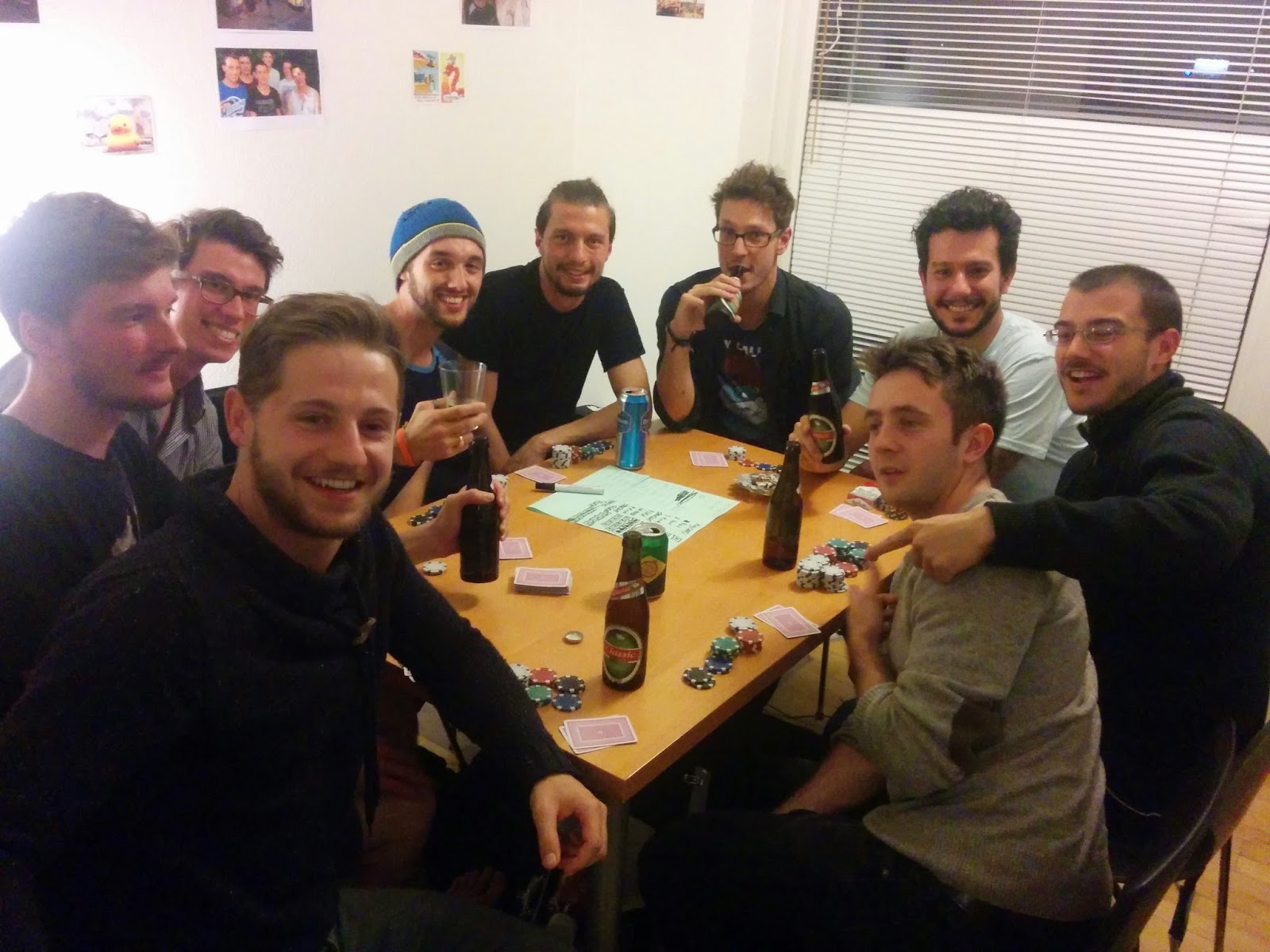Being as I am, an ardent traveller from an isolated country - living in Europe presents blissfully easy travel opportunities.
Stiff competition between a littany of budget airlines and bus companies as well as a a bunch of ride-sharing website (see Gomore or Mitfahrgelegenheit) mean it's seldom hard to find an affordable mode of transport somewhere (fancy a quick weekend in the Ukraine? Prices have never been this low!)
Last month I had a week to kill (being stuck in a small Danish city during bouts of shitty weather does elicit murderous impulses). I took the opportunity to zip down through Berlin, Warsaw and Krakow in the space of a week - ticking off Tripadvisor attractions with German-like efficiency.
I haven't spent much time in Eastern Europe til now but the super cheap prices, friendly folk and general range of interesting activities have left me wanting more. Needless to say, Europe's East also has many beautiful women and this boosts the stock of any destination, amirite?
Through a deft bit of luck, I managed to find a bus ride from Aarhus to Berlin for just 1 Danish Krone (about 15 Euro cents). The average cost to Berlin by bus is 400 DKK (53 Euro) so upon discovering the sale, I rushed to make a booking, fearing I'd miss out. Faced with this incredible bargain, a crowd of zero other people showed up.
I took the eight-hour bus ride from Aarhus to Berlin accompanied by the Danish driver and his wife (who determinedly knitted throughout the journey). Apparently 17 people had booked but I was the only one to show up. The long trip with the top floor to myself allowed me to do the sorts of things most people wish they could do during long bus trips (No, not that you filth!). I lay down across the aisles and busted a few travel exercised along the way, sipping on the seemingly unlimited supply of rather awful coffee. When the opportunity presents, this Kiwi really knows how to live it up!
The first time I went to Berlin
WAAAYYY back in 2011 when I first came to Europe, Berlin left a special impression on me. During that trip in which I spent four months backpacking and Couchsurfing around Europe, I visited great cities such as London, Rome, Dublin and Paris. Berlin however, was in my estimation the coolest of all European capitals.
Berlin - the German families chilled cousin
In my two subsequent visits to Berlin in 2015 - a little of the sheen has come off. I like the grittiness, the tolerance of diversity and lifestyle choices. In my more recent visits I noticed the graffiti (which is practically everywhere, even on public monuments) and rubbish on the streets in some areas more than I did the first time. For some, this is part of Berlin's appeal. It doesn't pretend to be the most glamorous city in the world - it embraces people on the periphery. Berlin is a type of Neverland, where someone might feel like wearing a Bugs Bunny onesie in the middle of the day or partying in fetish gear and literally no one cares.
It's my impression that some of the German stereotype many people have in their mind (no humour, meticulous planners, incredibly orderly) does not align with the average Berliner (then again, what the hell is "average"?).
If Germany is a family then Berlin is a relaxed cousin - still living at home with his parents at 29, quite alternative - well versed in history and culture but not as studious as his older brother Munich who works as an Engineer.
Berlin is by far Germany's biggest city with around 3,300,000 inhabitants. The next biggest is Hamburg with only 1.6 million. In spite having only half the population, Hamburg has a greater GDP. There are also at least 10 major Germany cities (that I saw) with a higher GDP per capita than Berlin.
One of my oldest friends is a guy born in China who lived in New Zealand between 13-21. He's now been living in Europe for more than six years. After being a scientist at a Swiss pharmaceutical company for several years, he packed up his life and shifted to Berlin where he's cast aside the rigidity he needed to get by in Swiss society and took to Berlin's Bohemian vibe with relish. He's taking his time finding out what he really wants to do with his life and has enough money to support himself as he parties, attends pub quizzes and sporadically travels (an awfully familiar story).
My friend and I had a relaxed couple of days, ambling around town and chilling.
Templehof Airport
One of the highlights was seeing the ENORMOUS abandoned Templehof airport in South-Central Berlin. It's hard to give you a sense of just how expansive this place is as you stand on the outside. Closed in 2008, the central terminal and the runway are all still in tact and today the grounds are used as a park for kite-borders, dog-walkers, rubber-neckers, necker-rubbers, gangle-wobblers, doblin-fafflers and sklange-doffers.
A few rusting aircraft are situated at various spots aground the grounds. Half-hearted wire fences protect the planes from curious visitors who would probably be crushed by falling debris if they got too close.
This place is highly recommended.
Russian Soldier memorial
On the same day, we also looked at a stately monument erected to the Russian soldiers who died fighting the Nazis during WW2 (Doesn't every conversation about Germany always end up being about the war?) It was similarly gigantic. Something very specific about the feeling I get in Berlin is the sense of large wide-opened spaces. If you compare to neighbouring European capitals such as Amsterdam or Copenhagen, Berlin is just much
Berlin st me as a place with plenty of wide-open spaces compared to other European cities I've visited.
More on the glorious Russians to come!
Ride sharing with speed demons:
On our way from Berlin we were with a Russian couple (who lived in Germany) who loved hip hop music, bred cute dogs and owned a sweet ride. They were going to Minsk and our female driver topped 200kph at some stages of the journey. On the Autobahns this is totally koshure but Poland's speed limit is 130 so we were a little naughty!
In NZ, we have a competitively laughable speed limit of 100kph. The argument goes that our roads aren't big enough to handle higher speeds, speed kills (which it can of course) but I think the slow speeds on modern highways lead to frustration from many drivers. Anywayss.
WARSAW - Tour highlights.
We had a Couchsurfing place sorted out in a reasonably central suburb, so it was only a short journey to downtown.
One of the surprises of Warsaw on first impression was how clean it was compared to Berlin. The subway stations were relatively spotless. The downtown was modern and pleasant.
We caught tour of the downtown on our first day seeing Marie Curie's place, the Jewish ghetto, various monuments to the war, the palace of a Polish
Poles don't hate Germans as much as I expected
In our conversations with locals (and let's admit that this is highligh
On the way back we were with a Polish entrepreneur around our age who had moved to Berlin as a teenager and ran a cleaning and rental management company. He drove conservatively at first but after gauging our behaviour let his foot run wild. At some stage of the journey we hit 212km! This was the fastest I'd ever been on land.
Stiff competition between a littany of budget airlines and bus companies as well as a a bunch of ride-sharing website (see Gomore or Mitfahrgelegenheit) mean it's seldom hard to find an affordable mode of transport somewhere (fancy a quick weekend in the Ukraine? Prices have never been this low!)
 |
I haven't spent much time in Eastern Europe til now but the super cheap prices, friendly folk and general range of interesting activities have left me wanting more. Needless to say, Europe's East also has many beautiful women and this boosts the stock of any destination, amirite?
 |
| On the bus all alone - perhaps my chronic flatulence scared others away? |
I took the eight-hour bus ride from Aarhus to Berlin accompanied by the Danish driver and his wife (who determinedly knitted throughout the journey). Apparently 17 people had booked but I was the only one to show up. The long trip with the top floor to myself allowed me to do the sorts of things most people wish they could do during long bus trips (No, not that you filth!). I lay down across the aisles and busted a few travel exercised along the way, sipping on the seemingly unlimited supply of rather awful coffee. When the opportunity presents, this Kiwi really knows how to live it up!
The first time I went to Berlin
WAAAYYY back in 2011 when I first came to Europe, Berlin left a special impression on me. During that trip in which I spent four months backpacking and Couchsurfing around Europe, I visited great cities such as London, Rome, Dublin and Paris. Berlin however, was in my estimation the coolest of all European capitals.
Berlin - the German families chilled cousin
In my two subsequent visits to Berlin in 2015 - a little of the sheen has come off. I like the grittiness, the tolerance of diversity and lifestyle choices. In my more recent visits I noticed the graffiti (which is practically everywhere, even on public monuments) and rubbish on the streets in some areas more than I did the first time. For some, this is part of Berlin's appeal. It doesn't pretend to be the most glamorous city in the world - it embraces people on the periphery. Berlin is a type of Neverland, where someone might feel like wearing a Bugs Bunny onesie in the middle of the day or partying in fetish gear and literally no one cares.
It's my impression that some of the German stereotype many people have in their mind (no humour, meticulous planners, incredibly orderly) does not align with the average Berliner (then again, what the hell is "average"?).
If Germany is a family then Berlin is a relaxed cousin - still living at home with his parents at 29, quite alternative - well versed in history and culture but not as studious as his older brother Munich who works as an Engineer.
Berlin is by far Germany's biggest city with around 3,300,000 inhabitants. The next biggest is Hamburg with only 1.6 million. In spite having only half the population, Hamburg has a greater GDP. There are also at least 10 major Germany cities (that I saw) with a higher GDP per capita than Berlin.
One of my oldest friends is a guy born in China who lived in New Zealand between 13-21. He's now been living in Europe for more than six years. After being a scientist at a Swiss pharmaceutical company for several years, he packed up his life and shifted to Berlin where he's cast aside the rigidity he needed to get by in Swiss society and took to Berlin's Bohemian vibe with relish. He's taking his time finding out what he really wants to do with his life and has enough money to support himself as he parties, attends pub quizzes and sporadically travels (an awfully familiar story).
Templehof Airport
One of the highlights was seeing the ENORMOUS abandoned Templehof airport in South-Central Berlin. It's hard to give you a sense of just how expansive this place is as you stand on the outside. Closed in 2008, the central terminal and the runway are all still in tact and today the grounds are used as a park for kite-borders, dog-walkers, rubber-neckers, necker-rubbers, gangle-wobblers, doblin-fafflers and sklange-doffers.
 |
| Using his magical powers, Yimu managed to summon a ray of light directly onto his hand |
A few rusting aircraft are situated at various spots aground the grounds. Half-hearted wire fences protect the planes from curious visitors who would probably be crushed by falling debris if they got too close.
This place is highly recommended.
Russian Soldier memorial
On the same day, we also looked at a stately monument erected to the Russian soldiers who died fighting the Nazis during WW2 (Doesn't every conversation about Germany always end up being about the war?) It was similarly gigantic. Something very specific about the feeling I get in Berlin is the sense of large wide-opened spaces. If you compare to neighbouring European capitals such as Amsterdam or Copenhagen, Berlin is just much
Berlin st me as a place with plenty of wide-open spaces compared to other European cities I've visited.
More on the glorious Russians to come!
 |
| Berlin Soviet War memorial - Tretow |
TO POLAND
Ride sharing with speed demons:
On our way from Berlin we were with a Russian couple (who lived in Germany) who loved hip hop music, bred cute dogs and owned a sweet ride. They were going to Minsk and our female driver topped 200kph at some stages of the journey. On the Autobahns this is totally koshure but Poland's speed limit is 130 so we were a little naughty!
In NZ, we have a competitively laughable speed limit of 100kph. The argument goes that our roads aren't big enough to handle higher speeds, speed kills (which it can of course) but I think the slow speeds on modern highways lead to frustration from many drivers. Anywayss.
WARSAW - Tour highlights.
We had a Couchsurfing place sorted out in a reasonably central suburb, so it was only a short journey to downtown.
One of the surprises of Warsaw on first impression was how clean it was compared to Berlin. The subway stations were relatively spotless. The downtown was modern and pleasant.
We caught tour of the downtown on our first day seeing Marie Curie's place, the Jewish ghetto, various monuments to the war, the palace of a Polish
Poles don't hate Germans as much as I expected
In our conversations with locals (and let's admit that this is highligh
 |
| Marie Curie (Double Nobel prize winning physicist and chemist) artwork across the road from the museum dedicated to her. |
 |
| Part of the reconstructed Polish castle. |
 |
| Some Polish fare. |
 |
| Replica tunnel at the Polish resistance museum |
On the way back we were with a Polish entrepreneur around our age who had moved to Berlin as a teenager and ran a cleaning and rental management company. He drove conservatively at first but after gauging our behaviour let his foot run wild. At some stage of the journey we hit 212km! This was the fastest I'd ever been on land.






































